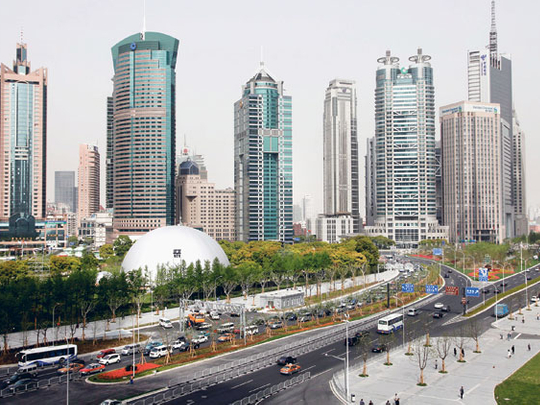
Beijing: China will slap a moratorium on domestic share issues by real estate firms as part of a broader campaign to rein in surging property prices, potentially blocking $16.1 billion (Dh59.1 billion) in capital raising, state media said Wednesday.
The move could delay plans by 45 Chinese companies to raise a total of about 110 billion yuan (Dh59 billion) through share sales, unidentified sources close to the China Securities Regulatory Commission told media.
When contacted by Reuters, a CSRC official denied that a formal suspension was in place, but confirmed that the securities regulator and the land resources ministry were examining whether property firms had illegally manipulated land prices before approving any share issues in the Chinese market.
Tightened lending
There was no indication that the suspension would be extended to debt issues or other forms of capital raising by property companies. Many Chinese developers have been selling bonds to raise funds in recent months as banks have tightened lending.
Worried about a potentially destabilising asset bubble, Beijing has been trying to cool the real estate market, raising mortgage rates and down payment requirements for second homes and pushing local governments to clamp down on speculators.
China's banking regulator has also issued new guidelines to make it harder for property developers to obtain funding from trust companies, the 21st Century Business Herald quoted an unidentified executive at a trust company as saying.
Real estate firms seeking loans from trust firms must meet the minimum capital requirement and provide proof of their qualifications for developing a project, the newspaper said.
This would represent a tightening of rules governing the financing relationship between trust firms and property developers. Real estate firms have turned to trust companies because they have lower capital requirements than banks.
With the economy roaring to 11.9 per cent year-on-year growth in the first quarter, its fastest since 2007, China has been winding down last year's ultra-loose policies.
But it remains fearful of over-tightening in an uncertain global economic environment and has relied largely on administrative measures rather than blunter market tools like interest rates to tame the property sector.
Urban property price inflation accelerated to 11.7 per cent in the year to March from February's 10.7 per cent pace. But economists believe the official figures grossly understate the extent of price rises, especially in major cities.
Clampdown
Share prices of property firms listed in China and Hong Kong have tumbled over the past week as Beijing has unveiled new measures to cool home prices, dragging the Shanghai stock index to its lowest level in more than half a year.
David Ng, a property analyst with Royal Bank of Scotland in Hong Kong, said a moratorium on share issues would have less of an impact on the property sector than moves to tighten mortgage requirements, noting that more than 80 per cent of developers' funds come from mortgage payments and down-payments from buyers.
In addition, the biggest Chinese developers are also listed in Hong Kong and would still be able to issue equity overseas without CSRC approval, Ng said.
"But it is in line with all the gestures that we have seen, the [tightening] campaign. It is almost as if there is one new thing every day," he said.
- $16.1b of capital potentially blocked by move
- 11.7% property price inflation last year











